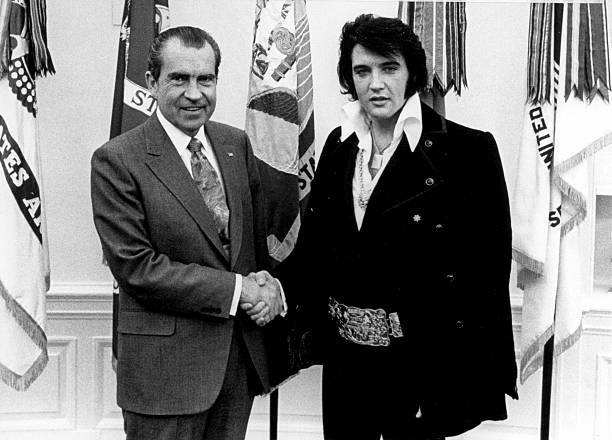 Introduction and Short Summary of the Song
Introduction and Short Summary of the Song
Released in late 1968 and prominently featured in Elvis Presley’s legendary NBC television special—commonly known as the ’68 Comeback Special—“Memories” is one of Presley’s most poignant and reflective recordings. Written by Billy Strange and Mac Davis, the song was composed specifically for the special and performed during a sequence that highlighted Presley’s sentimental side. Unlike the fiery rock and roll performances that reestablished him as a dominant force in popular music, “Memories” showcased tenderness, nostalgia, and emotional vulnerability. It quickly became a fan favorite, peaking at number 35 on the Billboard Hot 100 in early 1969, and it has since remained one of Presley’s most enduring ballads.
Origins of the Song
“Memories” was written in 1968 by Billy Strange, a seasoned musician and arranger, and Mac Davis, who would later become a respected singer-songwriter in his own right. Producer Steve Binder, who directed the NBC special, wanted a new ballad to balance Presley’s set list of rock and gospel performances. Strange and Davis delivered “Memories,” a song perfectly suited to Presley’s voice and the special’s themes of reflection and rebirth.
---> Scroll down for the VIDEO
Presley recorded the track at Western Recorders Studio in Hollywood on June 24, 1968, accompanied by top Los Angeles session musicians. The arrangement featured strings, piano, and gentle percussion, emphasizing mood and atmosphere rather than power. This marked a return to Presley’s ballad style of the early 1960s but with a more mature emotional tone.
Why Elvis Released “Memories”
By 1968, Presley’s career was at a crossroads. After years dominated by formulaic movie roles and soundtrack songs, his popularity had declined. The NBC special was designed as a career revival, showcasing Presley’s roots in rock and roll while also reminding audiences of his ability to interpret heartfelt ballads.
---> Scroll down for the VIDEO
“Memories” was chosen for the special because it provided a moment of intimacy amid the energetic performances. Its nostalgic lyrics fit perfectly with the theme of looking back on the past while moving toward the future. The single release in December 1968 further capitalized on the renewed excitement surrounding Presley’s career, giving fans a taste of his softer side.
The Message Conveyed in the Song
The lyrics of “Memories” reflect longing for the past and the bittersweet nature of nostalgia. Lines such as:
“Memories, pressed between the pages of my mind,
Memories, sweetened through the ages just like wine”
convey the tenderness of cherished recollections, while also acknowledging their distance and irretrievability.
The message is universal: an acknowledgment that life’s sweetest moments cannot be relived but remain preserved in memory. Presley’s interpretation adds emotional weight, suggesting both warmth and melancholy. His delivery makes the song feel personal, as if he were reflecting on his own journey from his early rock and roll days to the mature artist he had become.
The Recording and Musical Characteristics
Musically, “Memories” is arranged as a lush pop ballad with elements of orchestral pop.
-
Strings and piano dominate the arrangement, creating a smooth and flowing backdrop.
-
Subtle percussion and bass keep the rhythm gentle, never overpowering the mood.
-
Acoustic guitar flourishes add warmth and intimacy.
Presley’s vocal performance is restrained but deeply expressive. He avoids the vocal power he often displayed in his gospel or rock numbers, instead focusing on nuance and emotional phrasing. His ability to convey longing with soft dynamics and careful emphasis is central to the song’s impact.
The recording feels cinematic, matching the television special’s dramatic production style while also standing alone as a heartfelt ballad.
Cultural and Commercial Impact
“Memories” became a modest commercial success, reaching number 35 on the Billboard Hot 100 and number 7 on the Adult Contemporary chart in early 1969. While it did not match the chart dominance of Presley’s biggest hits, its importance lay more in its cultural role.
The song anchored one of the most touching moments in the ’68 Comeback Special, showing audiences that Presley was more than just the King of Rock and Roll—he was also a master interpreter of tender ballads. For fans who had followed him since the 1950s, the performance of “Memories” felt like a bridge between past and present, reminding them of the young star they first fell in love with while embracing his maturity.
The single also reinforced Presley’s return to serious artistry, paving the way for his 1969 recordings at American Sound Studio, where he would produce classics like “Suspicious Minds” and “In the Ghetto.”
Legacy of “Memories”
Today, “Memories” is remembered as one of Elvis Presley’s most touching ballads and a highlight of his late 1960s catalog. It remains closely associated with the ’68 Comeback Special, often seen as the emotional centerpiece of the program.
The song has appeared in numerous Presley compilations and retrospectives, continuing to resonate with fans who appreciate its themes of love, nostalgia, and the passage of time. Its influence also extended to later artists who cited Presley’s ability to elevate simple ballads into deeply moving experiences.
More broadly, “Memories” represents the turning point of Presley’s late career. While it may not have been his biggest commercial hit, it signaled the reemergence of his artistry after years of stagnation, reminding the world of his interpretive depth.
Nearly six decades later, “Memories” endures as a timeless ballad, encapsulating both the personal and universal aspects of nostalgia. It stands as proof that even in the midst of a career comeback defined by raw energy and rock and roll power, Presley could still captivate audiences with tenderness and emotional honesty.